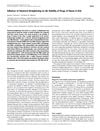4 citations,
January 2022 in “Cosmetics” Avoid high-tension styles and use professional treatments to reduce hair damage and health risks.
[object Object] 4 citations,
June 2020 in “Cosmetics” Broussonetia papyrifera extract helps hair growth by regulating specific proteins.
3 citations,
December 2021 in “Frontiers in Pharmacology” Ficus benghalensis leaf extracts can effectively promote hair growth and inhibit hair loss.
 August 2024 in “Applied Sciences”
August 2024 in “Applied Sciences” Plant extracts may help prevent or reverse hair graying.
 November 2023 in “International Journal of Cosmetic Science”
November 2023 in “International Journal of Cosmetic Science” Wheat polar lipid complex reduces hair loss and improves hair growth in women.
Sesa oil, Keshking oil, and Parachute oils were the most available hair loss treatments in Bhilai-Durg city during 2011-12.
[object Object] August 2024 in “Cosmetics” Peanut callus extract helps grow hair and prevent hair loss.
June 2024 in “Journal of Drug Delivery Science and Technology” Nanocarrier-based treatments show promise for better hair growth in androgenetic alopecia but need more research.
 October 2022 in “IntechOpen eBooks”
October 2022 in “IntechOpen eBooks” Hair loss due to scarring can be treated by reducing inflammation, removing scar tissue, and transplanting hair. The Follicular Unit Extraction technique is effective but requires skill and time. Future focus should be on scar-less healing methods.
 14 citations,
January 2019 in “Journal of Natural Medicines”
14 citations,
January 2019 in “Journal of Natural Medicines” Chaga mushrooms contain compounds that may promote hair growth better than common treatments.
 9 citations,
July 2021 in “Journal of Natural Medicines”
9 citations,
July 2021 in “Journal of Natural Medicines” Over 150 new molecules with biological activities were found in traditional herbal medicines, some with potential for new drug development.
24 citations,
January 2012 in “Journal of natural science, biology and medicine” Tinea capitis is common among Kolkata school children, especially boys, and hygiene doesn't greatly impact infection rates.
 September 2023 in “Journal of Natural Fibers”
September 2023 in “Journal of Natural Fibers” Drying hair with a microfiber towel better maintains hair strength and structure than using a cotton towel or blow-drier.
 10 citations,
April 1976 in “Archives of Dermatology”
10 citations,
April 1976 in “Archives of Dermatology” A woman's significant hair loss was linked to rapid weight loss and hormone injections.
 1 citations,
April 1976 in “Archives of Dermatology”
1 citations,
April 1976 in “Archives of Dermatology” Sudden weight loss can cause significant hair loss, and using colchicine on the skin for psoriasis may be unsafe.
 41 citations,
October 2000 in “Dermatologic clinics”
41 citations,
October 2000 in “Dermatologic clinics” Better hair care products are needed to protect against grooming and chemical damage.
 25 citations,
May 2019 in “Heliyon”
25 citations,
May 2019 in “Heliyon” Hair treatments cause significant structural changes, especially with excessive heat, regardless of ethnicity.
 8 citations,
October 2014 in “Journal of analytical toxicology.”
8 citations,
October 2014 in “Journal of analytical toxicology.” Chemical hair straightening significantly reduces detectable drug levels in hair.
 7 citations,
November 2004 in “International Journal of Cosmetic Science”
7 citations,
November 2004 in “International Journal of Cosmetic Science” Hair breaks differently when wet or dry and is affected by its condition and treatments like perms and bleaching.
 5 citations,
October 2013 in “Clinics in Plastic Surgery”
5 citations,
October 2013 in “Clinics in Plastic Surgery” Hair transplant improves with regenerative medicine and FUE technique.
 3 citations,
June 2004 in “Alternative and Complementary Therapies”
3 citations,
June 2004 in “Alternative and Complementary Therapies” The document concludes that hair loss is influenced by genetics and other factors, and while treatments like finasteride can help, they have limitations and side effects.
 3 citations,
April 2019 in “Journal of Cosmetic Dermatology”
3 citations,
April 2019 in “Journal of Cosmetic Dermatology” Women's facial moisturizers cost more per ounce than men's.
 2 citations,
January 2015 in “Springer eBooks”
2 citations,
January 2015 in “Springer eBooks” Environmental factors and exposure to toxins may contribute to male infertility by affecting sperm and hormone function.
 183 citations,
January 2018 in “Cosmetics”
183 citations,
January 2018 in “Cosmetics” Essential oils in cosmetics can offer benefits but may cause allergies and should be used carefully.
 165 citations,
January 2014 in “Dermatology Research and Practice”
165 citations,
January 2014 in “Dermatology Research and Practice” Zinc is effective for treating various skin conditions, including warts and acne.
 73 citations,
July 2016 in “Cosmetics”
73 citations,
July 2016 in “Cosmetics” Mushrooms have beneficial properties for skin and hair care products and have great potential for future cosmetic use.
 72 citations,
July 2008 in “Dermatologic Therapy”
72 citations,
July 2008 in “Dermatologic Therapy” CCCA is a scarring hair loss condition mainly in African descent women, possibly caused by genetics and hairstyling, treated with gentle hair care and medications.
 62 citations,
January 2003 in “Dermatology”
62 citations,
January 2003 in “Dermatology” Sunlight worsens hair loss; protect scalp.
 49 citations,
July 2009 in “Fitoterapia”
49 citations,
July 2009 in “Fitoterapia” Essential oils from Chamaecyparis obtusa may help hair grow by increasing a growth-related gene.
 48 citations,
October 1996 in “Dermatologic clinics”
48 citations,
October 1996 in “Dermatologic clinics” Some treatments can help with hair regrowth in alopecia areata, but results vary and long-term use is often needed without changing the disease's outcome.






















